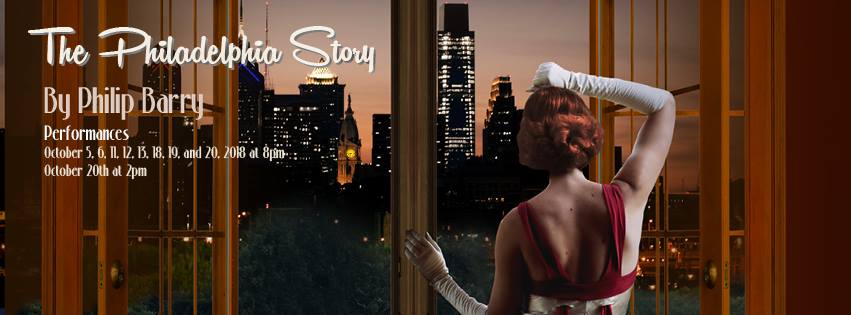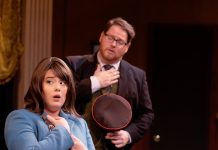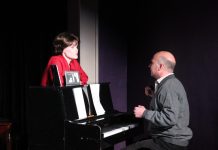Philadelphia 1939. The Great Depression is nearly over and the United States is on the brink of war. Sent out by a gossip weekly to cover the wedding of socialite Tracy Lord (Lauren Devoll), reporter Mike Connor (Sam Stenecker) begrudgingly takes on what he considers a demeaning and inconsequential assignment, given the state of national affairs, and the more worthy sides of Philadelphia (“the historical,” “the industrial”) worth considering.
First performed on Broadway in 1939, Philip Barry’s The Philadelphia Story is better known by popular audiences for its 1940 film rendition of the same name, which stars Katharine Hepburn, Cary Grant, and James Stewart, amongst other big-name Golden Age of Hollywood talent above and below the line. Audiences today will be hard pressed to find modern relevance in this product of an admittedly very white and very sexist era, but Barry’s lively script is hard not to be taken with, if at least for the antics.
This new production of The Philadelphia Story by St. Mark’s Players makes no effort to shake up the casting or take any new writing or directorial risks that might adapt the classic play to better suit the times. What this very true-to-the-original rendition does allow for, however, is a re-appreciation of an iconic artistic period and its distinct screwball comedy ensembles. Despite the distance in time between then and now, Barry’s snappy, often very funny language continues to delight, and the ensemble cast as a whole capture the rhythm needed to make this performance an altogether amusing time.
When news leaks of patriarch Seth Lord’s (Stuart Fischer) alleged affair with a Broadway dancer, nervous but dutiful son Sandy Lord (Will MacLeod) scrambles to perform damage control and clear the family name by inviting the apprehensive Connor and his work partner-cum-girlfriend, photographer Liz Imbrie (Fiona Meager) to stay as guests at the spectacular Lord residence for the days leading up to Tracy’s wedding. Tracy, her kid sister Dinah (Caitlin O’Hara), and mother Margaret (Heather Cipu) put on a somewhat deceptive performance that exaggerates their hoity-toity demeanor to fit rightfully mockable stereotypes of the privileged, while kooky Uncle Willie (a delightfully off-key John Henderson) briefly passes as their absent father. Truths about the Lord family, however, are conceded when the true Mr. Lord returns, and uptight groom-to-be George Kitteridge (Ernie Molina) and silver-tongued first husband Dexter Haven (Casey Ryan Ewell) make their way onto the scene.
The end of the first act brings all these characters together in the same room, where a cacophony of different perspectives and personalities play out and intermingle to great comedic effect. As a whole, the ensemble cast clicks wonderfully into place because each actor is so in tune with the comic beats that comprise the show. The caliber of individual performance quality was, however, noticeably inconsistent.
While the cast was across the board serviceable, MacLeod’s Sandy was rather stiff, and Meagher’s Liz Imbrie at times seemingly disaffected, while Cipu’s Margaret had a not-quite-right Mid-Atlantic accent. O’Hara’s prickly Dinah was stronger in the first half, and Ewell’s Dexter only hits his stride towards the back end of the performance.
The two standouts are undoubtedly Lauren Devoll and Sam Stenecker, whose drunken flirtations and late-night confessions in the second half of Act II are a dramatic high point for the production. Devoll’s Tracy uniquely channels Katherine Hepburn’s brassy, intelligent on-screen persona, her clever, expressive eyes, and that devil-may-care manner of speaking. Meanwhile, Stenecker deftly transforms from a snide, skeptical writer to a man fully enthralled by Tracy’s charms, without ever losing his penchant for poeticism.
Creative risk is fully absent from director Heather Danskin’s production, but this classic rendering of the original will still manage to win over fans of the beloved film and nostalgics of the sort of comic sensibility that defined Hollywood films of this era.
The play’s depiction of class difference will continue to feel timely so long as the “blows” that the privileged few take are “always softened,” and artists and writers continue to pay their bills by producing “cheap stuff for expensive magazines,” but its message of feminist empowerment will unfortunately feel dated– divorce no longer being the scarlet letter it used to be, and the drunken and unfaithful men in our lives not as easily endured. Likewise, while Connor might be convinced otherwise by the end of the play, the concessions to the old money elites that this classic tale is premised on will betray this work as a creature of its time.
Running Time: Two hours and 10 minutes, with one 15-minute intermission.
Sound Design by Brian Jones; Set Design by Ashley Holmes and Frank Mobilio; Costume Design by Erin Nixon.
The Philadelphia Story plays through October 20, 2018, at St. Mark’s Episcopal Church, 301 A St. SE, Washington DC. Tickets may be purchased at the box office or online.





